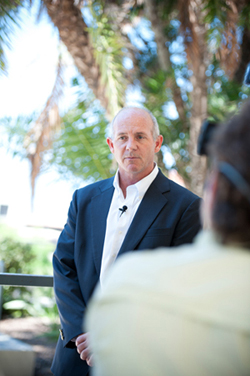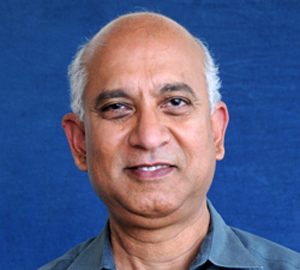A Solution-Minded Partnership: FF21 and the Qualcomm Institute
San Diego, Calif., Nov. 20, 2014 — Food and Fuel for the 21st Century (FF21) is concerned about big problems: feeding the world, treating disease and creating alternative fuel. To tackle those big problems, FF21 has partnered with another solution-minded institution at the University of California, San Diego: The Qualcomm Institute (QI).

At a recent research networking mixer hosted by QI (which is the UC San Diego division of the California Institute for Telecommunications and Information Technology), FF21’s research program manager, Wendy Stegman, gave an overview of FF21’s mission and history. It began when UC San Diego Biology professors Stephen Mayfield and Julian Schroeder decided three years ago to launch the Organized Research Unit.
“They wanted to bring together a group to tackle some of the 21st century issues around fuel and food production,” said Stegman, “to make it more sustainable, more effective and less resource intensive.” FF21’s goals are diverse and ambitious, ranging from the research on increasing the efficiency and sustainability of agriculture and algae production to the development of bio-products including biofuels, renewable plastics, oral vaccines, medicines and nutraceuticals (food with health benefits).
FF21’s expansive outreach has gone global with its massive open online course or MOOC, titled Our Energy Future. QI’s HD video recording studios were integral to the production of the MOOC, which to date has caught the attention of more than 26,000 registered participants on Coursera. The numbers alone point to the success of the program, but Mayfield shared another measure of success, “I get emails all the time from people that say, ‘Oh this completely changed my life.’ I just got an email from one of our students, who went down to Central America and built low-energy stoves for people because they were cooking with open-fire wood and that’s one of the things we cover in our MOOC – how bad that is.”
Researchers at FF21 also study green algae, e.g., Chlamydomonas reinhardtii, for biofuel production. Mayfield explains that it is not enough to have a plant that efficiently converts light to energy.
“What efficiency means is how do I get new chemical energy produced in the cheapest possible way? And we don’t mean cheap in a dollar sense. Cheap is using the least amount of resources. And those resources are land, they’re water, they’re labor, they’re nitrogen, they’re phosphate.”
To that end, Mayfield’s group has successfully replaced seven subunits of PSII or photosystem two (which are functional and structural units of protein complexes that are critical in the photosynthetic process) with reconstituted photosystems. This technology will allow them to teilor strains of algae to grow in more diverse environments (such as hotter climates) or in non-potable water, including saline water.
Researchers at FF21 also study oral therapeutics. There are several benefits to administering medicines orally: they do not require needles, patients are more likely to follow an oral regimen and they are less expensive than vaccines, in part because producing antigens right inside the algae removes the costly step of purification. Mayfield’s group has shown that there is promise in using oral therapeutics to administer anti-malaria drugs, for example.
“If you are producing these things for pennies per dose and don’t have to purify them,” added Mayfield, “then you have the opportunity to really change medicine.”
The researchers at FF21 are also working to engineer algae to produce colostrum. Colostrum is found in the breast milk of humans, mice, cows, blue whales and other mammals. The antibodies in colostrum keep babies safe from many bacterial and viral diseases, and colostrum supplements have the potential to greatly reduce people’s susceptibility to the bacteria that lead to diarrhea, the number one cause of death worldwide. Currently, FF21 researchers are targeting these colostrum-producing algae for the livestock and pet food markets to reduce the need for antibiotics, but ultimately hope it can be made available for human consumption.

While many FF21 projects reach well beyond southern California, one effort is homegrown. It is a collaboration with Earthlab, a project managed by a partnership between UC San Diego, San Diego Unified School District, Millennial Tech Middle School and Groundwork San Diego (a local non-profit organization), which aims to turn four acres of land in the Chollas Creek Watershed into an outdoor laboratory space for elementary, middle and high school students. FF21 will build an algae pond for Earthlab, which will be used to create biofuel and will be integrated into the school’s Common Core curriculum.
Srinivas Sukamar, Qualcomm Institute affiliate and project manager for Earthlab, started the collaboration with FF21 after striking up a conversation with Travis Johnson, program coordinator for FF21 (who happens to sit at the next desk over at QI headquarters in Atkinson Hall).
Sukamar explained, “It’s a perfect thing. I sit here, and I didn’t know what they were doing. One day, I struck up a conversation with Travis and said, ‘Oh hey, this what we do and we can make this connection.’ It’s exactly the intent of what Qualcomm Institute is, collaboration.”
Whether researchers at FF21 are producing therapeutics, plastics or biofuel, their goal is always to improve efficiency. Mayfield cited the espresso maker next to his office desk as a symbol of the type of industrial efficiency they are after.
“We imagine someday we’re going to want to engineer organisms and do true synthetic biology, where we dedicate one crop to harvesting sunlight energy, taking CO2 and making product X. Instead of having to do the 10,000 things that a real organism has to do to survive out there, I’m going to get rid of 9,999 of those so it can be hyper-efficient in just making this one thing.”
— Story by Maria Angelella
Related Links
Food & Fuel for the 21st Century
Media Contacts
Tiffany Fox, (858) 246-0353, tfox@ucsd.edu
